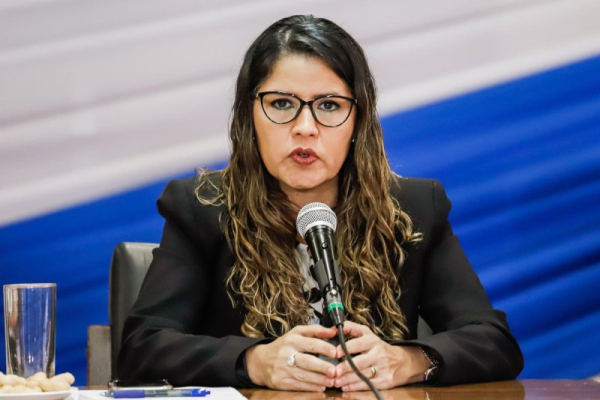

Cecilia Perez, Paraguay’s former justice minister, said weak state presence along Paraguay’s stretch of the Bioceanic Corridor could turn the new highway into a strategic route for organized crime once it becomes fully operational. File Photo by Nathalia Aguilar/EPA
Former Paraguayan Justice Minister Cecilia Pérez warns that weak state presence along Paraguay’s stretch of the Bioceanic Corridor could turn the new highway into a strategic route for organized crime once it becomes fully operational.
The Bioceanic Corridor is a major road project backed by Paraguay, Brazil, Argentina and Chile. In Paraguay the highway runs roughly 330 miles from Carmelo Peralta, on the border with Brazil, across the sparsely populated Chaco region to Pozo Hondo on the frontier with Argentina.
Pérez said customs officials, military units, police and regulatory agencies remain largely absent from key sections of the route. She argued that the lack of oversight creates vulnerabilities in an area known for minimal state control. “The full weight of the state needs to be present there,” she said in a radio interview.
The corridor is designed to link Brazil’s port of Santos on the Atlantic with the Chilean ports of Antofagasta and Iquique on the Pacific, cutting transport times and lowering export and import costs for goods moving across the continent.
Pérez noted that Paraguay is already a major producer of marijuana and a transit hub for cocaine originating in Bolivia and Peru before moving on to Brazil, Argentina, Europe and the United States. “Once the Bioceanic Corridor is running, we risk becoming a hub for organized crime and money-laundering,” she said.
An investigation by the Organized Crime and Corruption Reporting Project has documented clandestine airstrips and trafficking routes in the Chaco used to move cocaine from Bolivia into Paraguay, taking advantage of the region’s isolation and limited law-enforcement capacity.
Pérez also warned about the risk of criminal groups from the Pacific coast converging with Brazilian factions that already operate in Paraguay. “In Ecuador, Los Lobos function as a cell linked to Mexico’s Jalisco New Generation Cartel,” she said. “In Paraguay we cannot allow Pacific-based groups to cross paths here with the PCC, which has a strong presence in the region, because we would be caught in the middle.”
The Brazilian groups she mentioned-the Primeiro Comando da Capital (PCC) and the Comando Vermelho (CV)-both have documented operations inside Paraguay and were designated terrorist organizations by the Paraguayan government in October 2025.
Pérez added that the communities along the route would be the first to feel the impact. “People living in that area will pay the price. Or worse, these groups could form alliances, and Paraguay would become the geographic center of that criminal convergence,” she said.
She called for an immediate expansion of Paraguayan state capacity in the Chaco, including permanent checkpoints, enhanced surveillance technology, stronger interagency coordination and tighter financial-crime controls to prevent the new highway from becoming “a criminal superhighway.”
While the Bioceanic Corridor promises major economic benefits-speeding the export of beef, soy and Brazilian minerals to Pacific markets-it also presents a strategic security challenge for the region.